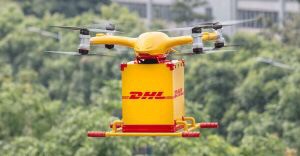End of the euphoria: DHL pulls out of drone project
Eight years ago, the demonstration of a DHL parcel drone in Bonn received a huge media response: a small aircraft called a “Paketcopter” flew over the Rhine, controlled by a pilot with a more or less conventional remote control, to land with a small parcel of medicines in front of DHL’s corporate headquarters. The mood was euphoric; nothing else was planned but to revolutionize the logistics of parcel services: Instead of continuing to deliver parcels in the area with overloaded delivery drivers in vans, in the future they wanted to deliver parcels by air with an enormous number of parcel copters, free of traffic jams.
Many questions arose: How will drones be used to deliver parcels during the Christmas season when there is ice and snow? How will the population react to thousands of drones as a new major source of noise? How will drones be integrated into the airspace, and how will this airspace, now called “U-Space,” be designed? There are still no good answers to most of these questions.
Not much has remained of the initial drone enthusiasm: for example, a DHL spokesman is quoted in an article in the newspaper Welt as saying that the Paketcopter project will not be continued. The mood among other parcel services such as Amazon Prime Air has also tended to plummet since the first announcements of the drone delivery service.
Although autonomous test flights are being carried out in the U.S., human airspace observers are still needed for this, as fully automatic collision avoidance in the air is still far from functioning reliably in mixed traffic.
Can we forget the issue of drones? No, certainly not. There are already many useful applications for drones today, in photography, rescue or agriculture. New applications will continue to be added. However, we are of the opinion that, viewed soberly and objectively, there will be a continuous evolution in drones rather than a major revolution. Drones will occupy new niches, but there will probably not be the mass applications originally hoped for or feared, depending on the point of view.

